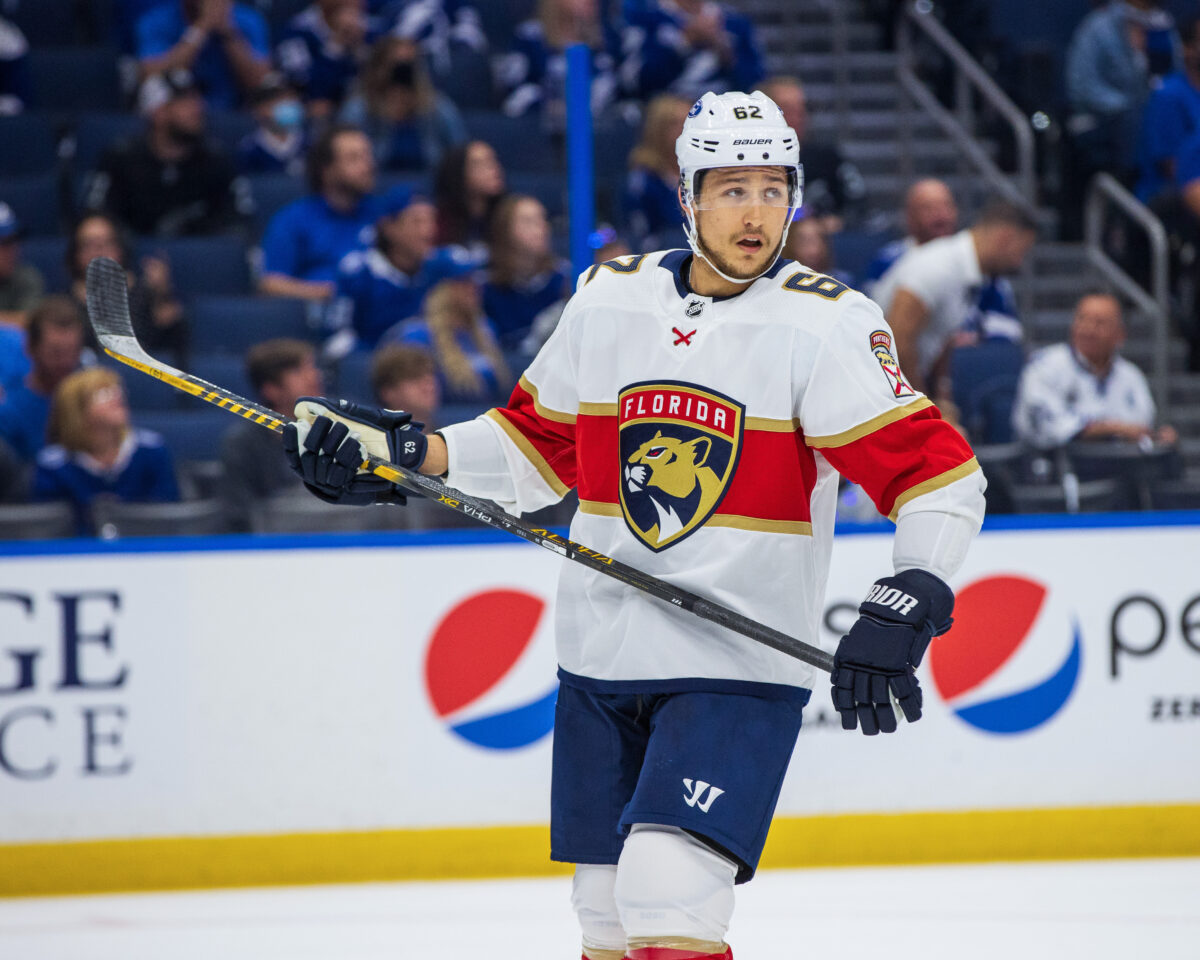In the aftermath of the unveiling of the NHL’s rosters for the 2022 All-Star Game, superstar Nathan MacKinnon of the Colorado Avalanche had a few choice words for the league’s selection process. He bemoaned the league’s mandate to send at least one representative from each of the NHL’s 32 franchises to the midseason marquee event, claiming it shouldn’t be seen as a “participation game”, but rather as a distinction reserved for the season’s top performers.
In my opinion, MacKinnon is correct to criticize the NHL’s selection process, as it ignores the spirit of what an All-Star competition should be, hampers players’ post-career legacies, and is an extension of the league’s obsession with manufacturing false parity. Let’s dig in.
Current All-Star Game Selection Process Ignores Deserving Candidates
Let’s start with the source of MacKinnon’s ire, as his teammate Nazem Kadri was passed over as one of the NHL’s initial selections for the Central Division’s All-Star roster. Kadri currently sits fifth in NHL scoring (48 points) behind Leon Draisaitl and Connor McDavid (both with 53), Alexander Ovechkin (52), and Jonathan Huberdeau (51), unfamiliar territory for the 31-year-old center. Further, his points-per-game rate of 1.6 places him second only behind McDavid and puts him on track to double his previous career-high of 61 points set in the 2016-17 season.
Of course, Kadri won’t continue to produce at his current prolific clip, but it’s a testament to his excellence this season that he’s being mentioned in the same breath as some of the NHL’s offensive superstars.
Yet, Kadri remains on the outskirts of the All-Star conversation, relegated to the sidelines by players such as Nick Suzuki of the Montreal Canadiens (19 points in 36 games), Clayton Keller of the Arizona Coyotes (26 in 34), and Jordan Eberle of the Seattle Kraken (24 in 34). Yes, I understand that the NHL has a commercial interest in involving every market in the midseason festivities, but that doesn’t make the exclusion of players like Kadri any more palatable.

To avoid harping on Kadri’s All-Star candidacy for too long, let’s identify several other deserving candidates who were passed over to fulfill the NHL’s mandate of naming at least one All-Star from each of its 32 franchises. I didn’t even have to dig deep to uncover worthy nominees, as Steven Stamkos (sixth in scoring), Brad Marchand (eighth), and Mikko Rantanen (ninth) are three other snubs from within the NHL’s top 10 leaders in points.
Igor Shesterkin (second in save percentage), Roman Josi (second in defencemen scoring), and Troy Terry (sixth in goals) all boast significant statistical cases for All-Star consideration, but likely miss out due to the league’s rigid standards.
I should note that I am all in favor of extreme special cases such as John Scott’s All-Star Game appearance, but those are far and few between, plus it was a PR goldmine in which the NHL nearly cast aside in its own vanity. The NHL should just get out of its own way and stop over-thinking these decisions, they might actually grow the game to a meaningful degree.
NHL All-Star Honours Impact Player’s Legacies
Debating a player’s place within NHL history is a favorite pastime of many fans, and All-Star appearances can figure heavily into those discussions. Further, those same appearances can be entered as evidence into a player’s Hall-of-Fame submission, outlining their consistent place among the NHL’s best over a long and storied career.
Being named an All-Star can also have financial incentives, as players can point to their appearances or nominations as a direct argument for increased compensation on their next contract. That’s not to mention the potential monetary rewards for participating (and winning) in the actual games at the event.
You may also like:
- Rangers Edge Canucks 4-3 in Back & Forth Affair
- 3 Takeaways From the Wild’s 4-2 Win Over the Blues
- After Back & Forth Efforts, Wild Secure 4-2 Win Over Blues
- Mark Scheifele’s Hat Trick Carries Jets to Win Over Panthers
- Oilers Ride Strong First Period to 5-2 Win Over Senators
Now, I’m not arguing that being named to the 2022 All-Star Game is the deciding factor in Kadri’s unlikely Hall-of-Fame admission, far from it. Yet, it could serve as a fascinating reminder to future generations that yes, Kadri enjoyed an incredible, one-off season where he kept pace with the likes of McDavid and Ovechkin.
As it’s unlikely that Kadri garners any year-end hardware, seeing as he doesn’t lead in any statistical category related to NHL awards, an All-Star nod could be the lone reminder for this unexpectedly productive campaign. If not for us, then for Kadri, for whom the recognition goes beyond any material benefits.
NHL’s All-Star Game Selection Process Another Forced Attempt at Parity
Forgive me for going off on a separate, but related, tangent. In making sure that every team is represented at the All-Star Game, the NHL continues to demonstrate their misguided obsession with fostering parity in today’s NHL. Every team must be included, regardless of actual position in the league standings, or whether their players stack up favorably to their peers.
The best aren’t permitted to shine, with their excellence capped by an arbitrary requirement meant to appease the league’s financial barons and advertising partners. It is understandable in some respects (the league needs revenue to survive after all), but a self-inflicted dependency due to feeble marketing efforts in the past.

The NHL’s current points system (two for a win, one for an overtime or shootout loss, zero for a regulation loss) incentivizes cautious play, with teams knowing maintaining a tie mutually benefits both parties. The focus on creating aesthetically pleasing offense is shackled, and the feeling has infected the 3-on-3 overtime format.
This is meant to keep teams in the playoff race longer and maintain fan interest for as long as possible, even though several teams clearly own a dismal win-loss record. Their true strength is obfuscated, and the league thrives on selling a mediocre product that could easily be improved with a few tweaks.
Although it’s not related to parity per se, the NHL’s current playoff system, which emphasizes divisional matchups early on in the postseason, inadvertently punishes the division’s top teams, with the second-and third-ranked divisional squads facing off in the first round of the playoffs.
Rather than keep a 1-through-8 playoff format where the most successful teams are rewarded for their regular-season excellence, the NHL insists on ham-fistedly manufacturing rivalries, rather than trusting on a natural evolution of hatred. The NHL continues to eschew better alternatives in favor of pursuing their narrow vision, and the All-Star game is an extension of that limited mindset.
NHL’s Last Men In Voting Extends Snubbed Players a Lifeline
Despite missing out on the initial roster announcement, any snubbed players have the opportunity to be named as their division’s 11th player through the NHL’s Last Men In voting campaign. The results of this last-ditch effort to get one’s favorite player to the All-Star Game could still end up sending Kadri to the midseason spectacle, but it doesn’t take away from MacKinnon’s initial point. The NHL falters when it comes to marketing its biggest and brightest, and the selection debacle is just the latest in a long line of missteps for a league that shows little appetite for progressive thinking.